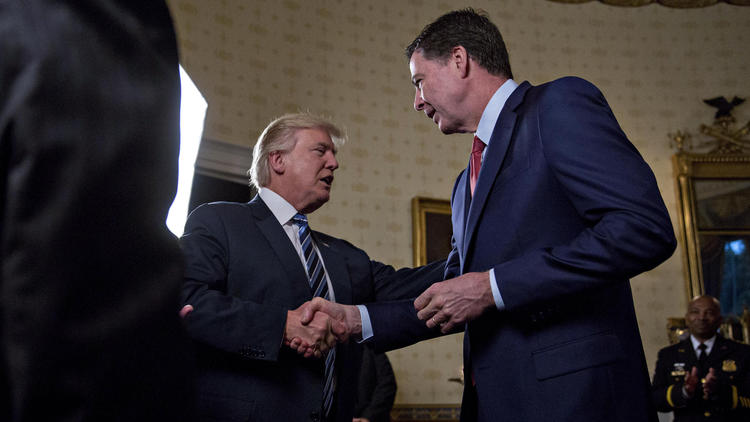Donald Trump's Unorthodox and Unsettling Presidency
BY MILO KAHNEY

On May 9, President Donald Trump, in a stunning move, fired FBI Director James Comey, claiming that Comey did a poor job handling the investigation into Hillary Clinton’s emails. Comey’s termination, however, also came days after he requested additional resources from the Justice Department for the FBI’s investigation into possible Russian interference in the 2016 presidential election. Trump even publicly stated that this investigation was a factor in the decision to fire Comey. This was a bombshell to Washington insiders and pundits have drawn comparisons to Richard Nixon’s Saturday Night Massacre. It is uncommon for an FBI director to be fired mid-term. In fact, it only has happened once, 24 years ago, when Bill Clinton fired William Sessions after Sessions was caught using government money to build a fence around his house and arranging government-paid trips to visit relatives. Unlike Comey’s firing, however, Sessions was first asked to resign and was under a Justice Department investigation. Trump firing Comey is unprecedented and is just one of the many examples of Trump breaking the norms of the presidency.
Norms are necessary in a democracy. Historically, strong democracies have had informal norms that most politicians and institutions follow. Norms, unlike laws, are not legally binding and take generations to develop. Breaking these patterns and attacking other institutions can damage democracy and have long-lasting effects. That is why it is important for institutions to stand up to the president when they break norms. A populist like Trump, however, is incentivized to break these norms because it seems like he is challenging a corrupt system.
Avoiding establishment tactics has helped Trump get elected. Since Trump announced his candidacy for president in June 2015, he has been breaking norms left and right. In the presidential debates he called Clinton the devil and accused Ted Cruz’s father of taking part in the assassination of John F. Kennedy. Almost everything he did during the election was politically unorthodox. In doing so, he beat veteran politicians like Clinton and Jeb Bush, who many Americans saw as corrupt and pieces of a broken system.
However, the start of his infant presidency has been a disaster. He has record-low approval ratings, his staff is constantly leaking stories, he has few legislative accomplishments to brag about and he is under federal investigation.
Trump is the only president since Nixon to not release his tax returns. His refusal to release his tax returns is troubling because of what he could be hiding. It is also hurting his administration since some Democrats will not budge on tax reform until he releases his tax returns. Trump has also committed nepotism by hiring his daughter Ivanka Trump and his son-in-law Jared Kushner. Kushner has been given a lot of responsibilities, like solving the Israeli-Palestinian conflict and ending the opioid epidemic and criminal justice reform, to name a couple. Trump attacked the courts after they rejected his travel ban, saying they are responsible for future terrorist attacks. He has also criticized reputable news sources that disagree with him, calling them “fake news” and threatening to open up libel laws. Breaking all of these norms threatens other institutions and, therefore, democracy.
However, breaking norms can be a good thing. When Lyndon Johnson was first elected to the Senate in 1949, the institution was run by the seniority system. Chairmanships to powerful committees were given out based on how long each senator had been in office. Junior members were not supposed to speak before their more tenured colleagues and many chairs of important committees were old and ailing. The seniority system overlooked merit and competence and, in doing so, slowed down the work of the Senate. When Johnson became the Senate majority leader in 1955, he started to unravel the seniority system by giving valuable committee seats to more junior but competent senators. This fundamentally changed the Senate and equipped it with the ability to handle the problems of a changing world.
When previous presidents broke norms, other institutions lashed out against the executive branch. For example, in 1937, when Franklin Delano Roosevelt’s New Deal program ran into resistance from the conservative Supreme Court, he devised a scheme to pack the court with liberal judges. This led to a lot of complaints from both Democrats and Republicans. The Senate voted against the scheme 70 to 22 and, afterwards, his domestic legislation was backed up in Congress, effectively killing the New Deal.
This type of institutional backlash has started to take place in the Trump administration. Federal judges have ruled against Trump’s travel ban, while Deputy Attorney General Rob Rosenstein has appointed a special counsel to further examine the president’s ties with Russia. However, as this country becomes more partisan, Republican-held institutions are less likely to stand up to Trump because they fear losing his base of support. With Trump constantly breaking norms, it is more necessary than ever for institutions to stand up to Trump.
